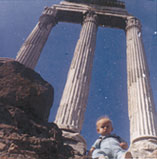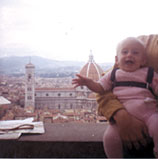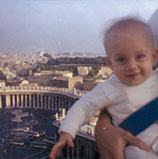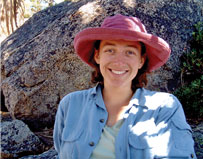Essay: Heather Rock Woods
The strong force of physicists
|
I learned calculus in kindergarten. Or I should have. Whenever I needed help in high school calculus, I tried every avenue before turning to Dad, because he inevitably (or so I remember) criticized my long-term memory. "You learned that in kindergarten," he would chastise.
My dad, the nuclear physicist. Nuclear as in understanding the nucleus of the atom, I always explained to my friends, "not as in the scary duck-and-cover," mushroom-cloud nuclear. My brother and I, and our hapless schoolfriends, learned about protons, neutrons, quarks, and gluons from a tender age.
Growing up in a physics household was actually tons of fun—even though we couldn't use the word "tons" unless we literally meant 4000-plus pounds of something. Thanks to my parents' love of adventure and the international nature of the high-energy physics community, my formative years weren't just about math and precision. I was born in Berkeley at the time that my dad, Steve Rock, was finishing his thesis for his advisor, Nobel laureate Owen Chamberlain (which impressed me, if not my playground pals). Before arriving in England for my dad's post- doctoral job, we traveled through Europe in a tiny orange car. The photos show a fuzzy-headed me held up in front of the monument of the day: the Roman Forum ruins, the Eiffel Tower, the Alps, Hadrian's Wall.
We settled in Appleton, a rural hamlet near the Daresbury lab. There I acquired a brother, an English accent (long since gone), and a memory of being stung by bees at the blackberry patch down the lane. Three years later we moved to Meyrin, the Geneva suburb then favored by young CERN visitors. My only physics memories of that time involve visiting the computer room (and it took a whole room to house the behemoth), and drawing on the punch cards used to program the computer.
We relocated to SLAC when I was six. On Saturday afternoon visits to the lab, my dad stationed us at terminals in the computer room next to his office, where we typed letters to our grandfather—thrilling stuff in the days before PCs. The printouts, perforated sheets with holes on the edges, also made good drawing paper.
My brother and I loved visiting the Counting House during an experiment, when doughnuts abounded. Jumbles of cables snaked along the floor under instrument crates with metal switches and analog dials, winding through holes in the floor to the massive experimental hall below. It seemed a miracle that this apparently cobbled-together ensemble produced cutting-edge results.
I'm now surprised when I encounter shiny copper cavities or polished stainless steel parts. It somehow feels like cheating to use gleaming new apparatus rather than dusty cables and old-fashioned oscilloscopes.
I spent the rest of my childhood within twelve miles of SLAC, but we had the world at our fingertips. My dad's graduate students and collaborators came from Iran, Greece, the Midwest (almost like another country when you grow up in a West-Coast household), Russia, Switzerland, France, and Poland. We took a Russian researcher backpacking in the days before the Cold War thawed, and he ate most of our food on the first day of the trip, ecstatic with the quantity and quality of food available to Americans without waiting in line.
Over far-flung dinner conversations covering politics, sport, art, music, science, and religion, with generous helpings of humor, it was always clear to my brother and me that physicists are far more than nerds. Yes, my dad repaired his glasses with tape sometimes, and had used a slide rule in high school, but he never used a pocket protector for his ever-handy pocketful of pens, and he's always had a simultaneous passion for opera and the Rolling Stones.
Now my kids are repeating the experiment: I'm married to a SLAC physicist. Last year, we traveled to Europe for two physics conferences; the photo album shows our kids in front of the Eiffel Tower and the Alps. I can use "tons" freely, but I have to watch out for "couple" (two), "few" (three) and "several" (four), or our indoctrinated five-year-old corrects me. I usually claim literary license—which might be why I became a writer.
Heather Rock Woods
Heather Rock Woods is a SLAC science writer and symmetry staff writer.
Click here to download the pdf version of this article.






